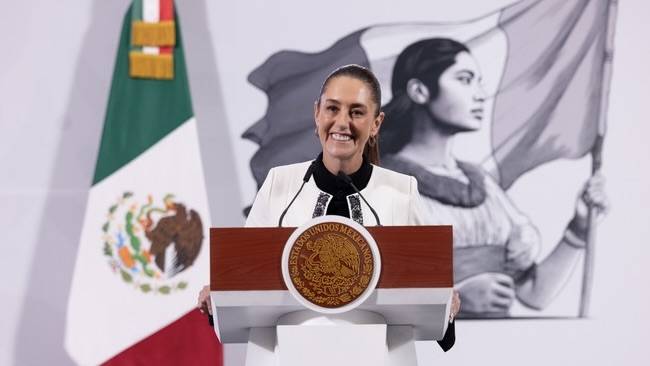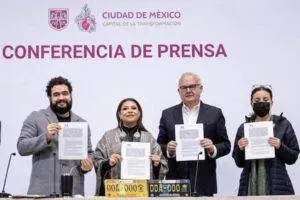— The report comes just days after president-elect Donald Trump said he would impose a 25% tariff on Mexican products if the country did not stop fentanyl from entering the US from Mexico.

On December 29, the New York Times published a story titled “This Is What Makes Us Rich’: Inside a Sinaloa Cartel Fentanyl Lab” which recounts how two NYT reporters witnessed the alleged handmade manufacture of fentanyl in a kitchen in Culiacán, the capital of Sinaloa state.
“We wore gas masks and hazmat suits, but the cook had on only a surgical mask. He and his partner had rushed here to fulfill an order for 10 kilograms of fentanyl. While one sniff of the toxic chemicals could kill us, they explained, they had built up a tolerance to the lethal drug,” states the report.
In the president’s daily morning press conference on January 2, several Mexican authorities, including the President, debunked some of the assertions in the report. Alejandro Svarch Pérez, medical doctor and the director of IMSS- Welfare, explained that it is impossible to manufacture fentanyl in a regular kitchen, as the report shows, without dying or having one’s health seriously affected: “This means that, when a person is exposed to a potent synthetic opioid by inhalation or mucosal contact, even in an amount as small as 4 or 5 small grains of salt, it can produce a degree of toxicity that compromises the life of the operator.”
In addition, Svarch clarified that, despite what one of the drug manufacturers claims in the report, “There is also no scientifically described physiological phenomenon known as ‘lethal tolerance to toxicity.’ This explains why a laboratory where exposure conditions can be controlled, where there is specialized equipment to perform the chemical synthesis and with professional ventilation systems is inexorably needed; not a domestic kitchen, as the report shows. It is not possible to make fentanyl as referred to in the note.”
For her part, Juana Peñaloza Ibarra, a precursor chemical analyst at the Navy Department, analyzed each of the images and videos published by The New York Times to conclude that the report does not show a series of chemical precursors essential for the manufacture of fentanyl, nor the necessary machinery, much less the minimum personal protective equipment, without which it is impossible to avoid intoxication from toxic gases during the manufacturing of the drug. “Therefore, it is concluded that there are insufficient elements to demonstrate that the information presented in the article of The New York Times documents a laboratory for the synthesis of fentanyl hydrochloride,” concludes Peñaloza.
Sheinbaum responds
Regarding The New York Times report, Mexico’s President Claudia Sheinbaum stated that the information provided in the article “does not contain credible information.” “Of course, we mainly combat the commercialization of these drugs, particularly fentanyl, and we are going to collaborate for humanitarian reasons always, to prevent possible trafficking of fentanyl to the United States from Mexico and the sale in our own country, which is combated in various ways. Next week we are already presenting the new campaign to prevent the consumption of drugs, particularly fentanyl, and from the perspective of public security and the Attorney General’s Office of the Republic. But here we are defending the right to information and whether or not it is feasible for a non-Mexican or non-Mexican media to publish notes that are not credible from a scientific perspective, as has been mentioned here.”
About the collaboration with US authorities in the fight against drug trafficking, Sheinbaum said, “We are going to collaborate with the United States, as we are collaborating now, for humanitarian reasons. There are more than 100,000 or close to 100,000 young people or people who die from fentanyl overdoses in the United States, something that does not happen in Mexico…Now, in Mexico, we do not accept interference, and we collaborate, but we do not subordinate ourselves, and that is how it will be.”
Finally, Sheinbaum launched several questions that challenge the burden of blame that several US media and politicians want to place solely on Mexico: “Do you believe that fentanyl is not manufactured in the United States? … Where are the drug cartels in the United States that distribute fentanyl in US cities? Where does the money from the sale of that fentanyl go in the United States?”
Following Sheinbaum’s press conference, The New York Times released a statement in response to “continued criticism” of their report affirming that it “stands behind every aspect of our reporting on fentanyl production and testing in Mexico.” In direct response to Mexico’s allegations that fentanyl could not be produced in the conditions depicted in the report, the NYT statement said, “As hazardous as it is, the synthesis of illegal fentanyl in Mexico under makeshift conditions like those seen by The Times is well established.”
Trump’s new war on drugs
The timing of the NYT report is worth noting as it comes just weeks before Donald Trump is set to be sworn in as president of the United States. Trump in his campaign and in the period since his victory, has sworn that halting fentanyl trafficking from Mexico is his top priority.
On November 25, 2024, Trump threatened to impose a 25% tariff on all products coming from Mexico and Canada to the United States “until Drugs, in particular, Fentanyl, and all Illegal Aliens stop this Invasion of our Country!”
However, threats against Mexico to stop fentanyl trafficking into the United States have gone beyond tariffs, with both Trump and incoming “border czar” Tom Homan mentioning on multiple occasions that they are considering classifying drug cartels as terrorist organizations and using the US military to “wage war” on them.
Writer and analyst José Luis Granados Ceja commented on December 22 that, “We may ultimately look back at the designation of organized crime groups as Foreign Terrorist Organizations as a prelude to unilateral military action inside Mexico by the US. US agencies have already crossed this line under Biden, it solves nothing and generates more violence.”
(Source; https://peoplesdispatch.org/2025/01/03/claudia-sheinbaum-debunks-ny-times-report-on-fentanyl-production)











